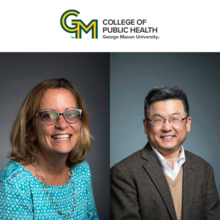- April 4, 2025
After 30 years of outstanding service to George Mason University’s health administration and policy programs, distinguished leader and cherished member of the College of Public Health P.J. Maddox will retire at the end of the 2024-25 academic year. Maddox, who has served for 20 years as chair of the Department of Health Administration and Policy and is co-director of the Virginia Center for Health Workforce, leaves behind a legacy of unparalleled dedication, innovation, and impact.
- July 17, 2024
With the help of Inova Health System, George Mason University is ready to partner with other Virginia universities on research to improve health during pregnancy and early childhood.
- June 25, 2024
New findings published in the Journal for Applied Gerontology by College of Public Health researchers suggest that personalized music intervention, especially with songs from adolescence and early adulthood, is effective at reducing the use of medication, alleviating agitation levels, and enhancing mood and social engagement among nursing home residents living with dementia.
- July 8, 2024
Professor Farrokh Alemi receives NIH grant to pilot first-of-its-kind, evidence-based artificial intelligence tool to address the medication needs of Black and African American people with depression. This is part of the college’s Innovate for Good story series.
- June 10, 2024
Research by Iulia Fratila, assistant professor in George Mason University’s College of Public Health, provides novel insights into attitudes and motivations among cannabis users aged 18-30.
- May 29, 2024
MeAgainMeds.com, a free AI-powered website, helps clinicians more effectively match patients with the optimal antidepressant using big data.
- May 29, 2024
Interprofessional research study from George Mason University found that family caregivers of older adults living with dementia experienced a 15% drop in stress after a 9-week online peer support program
- May 22, 2024
George Mason University Professor of Global Health and Epidemiology Amira Roess comments on the recently detected cases of bird flu in the United States.
- May 15, 2024
Scientists from George Mason’s College of Science and College of Public Health aim to harness the many advantages of urine testing over other methods and increase mainstream adoption.
- April 30, 2024
With tick bites on the rise, College of Science and College of Public Health are collaborating to improve detection, diagnosis, and treatment with urine testing.








